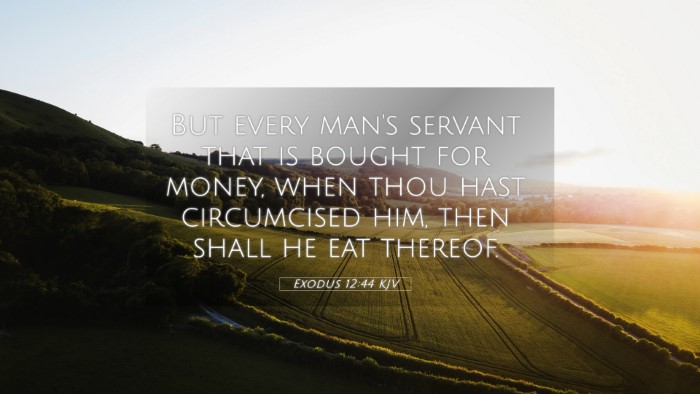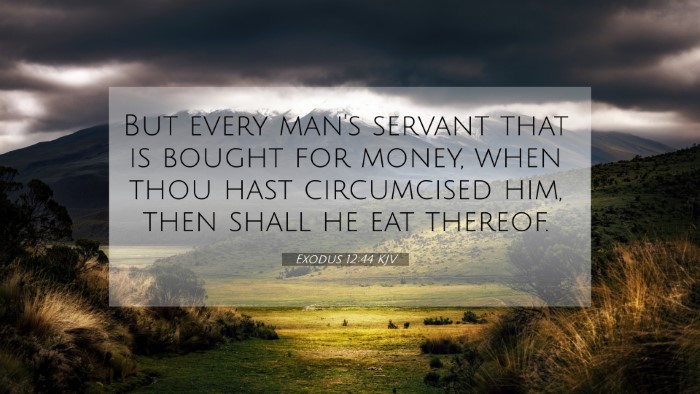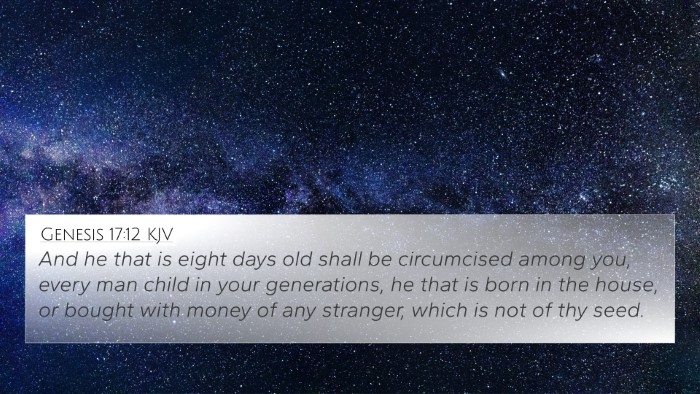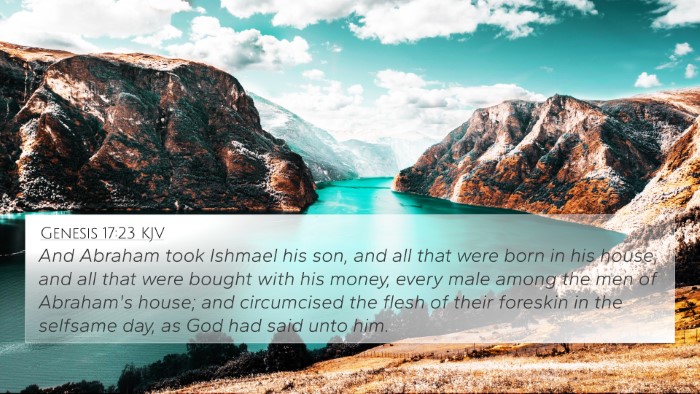Understanding Exodus 12:44
Exodus 12:44 states: "But every man's servant that is bought for money, when thou hast circumcised him, then shall he eat thereof." This verse is part of the broader context of the Passover, where God establishes regulations regarding who can partake in the sacrificial meal.
Summary of Insights
This verse underscores the importance of circumcision as a covenant sign. The inclusion of a servant, especially one who has been bought, implies that the household is also responsible for the spiritual well-being of those in their service. The act of circumcision represents obedience and submission to God's commandments, enabling the servant to share in the blessings of the covenant community.
Commentary Insights
- Matthew Henry's Commentary: Henry emphasizes that circumcision signifies the initiation into the covenant of grace. The act serves as a means of identification with God's chosen people. He suggests this demonstrates how God's covenant extends beyond biological descendants to include those who align themselves with His people through faith and observance.
- Albert Barnes' Notes: Barnes notes that this verse indicates the inclusivity of God's covenantal promises. It highlights how even hired servants can receive the advantages of the Passover if they meet the stipulations of the covenant, pointing towards a broader understanding of inclusion within God's community.
- Adam Clarke's Commentary: Clarke explains that the regulation concerning the servant implies a responsible covenant community, where the head of the household has the duty to spiritually guide and incorporate those within their care. This illustrates the comprehensive nature of God's salvation and how it extends to all willing to partake in His covenant.
Connections to Other Bible Verses
Exodus 12:44 is powerfully connected to various other scriptures, allowing for rich comparative study and thematic exploration. Here are some Bible verses that can be cross-referenced for deeper understanding:
- Genesis 17:10-14: This passage discusses the covenant of circumcision, outlining its significance as a physical sign of God's promise.
- Leviticus 22:10-13: These verses convey the requirements of who may eat from the holy offerings, further emphasizing the principle of purity and participation in community blessings.
- Acts 15:1-29: The early Church's deliberation on the necessity of circumcision reflects the ongoing question of inclusion in the covenant community.
- Romans 2:28-29: Here, Paul argues that true circumcision is a matter of the heart, drawing on the inclusivity theme present in Exodus 12:44.
- Galatians 3:28: This verse reinforces the idea of the radical equality within God's family, reiterating that all are one in Christ regardless of their former status.
- Colossians 2:11: Paul connects the concept of circumcision as it applies to the New Covenant believers, suggesting a deeper spiritual circumcision that transcends the physical.
- John 1:12-13: These verses speak to the theme of becoming children of God through acceptance of Christ, paralleling the acceptance of servants into the covenant community.
Thematic Analysis
Thematically, Exodus 12:44 can be understood as a representation of God's covenantal faithfulness and the extension of grace to all individuals, regardless of their societal status. It sets a precedent for understanding how God relates to His people and their inclusion in His promises.
Practical Applications
When interpreting Exodus 12:44, it is vital to consider its implications for contemporary faith practice:
- Understanding that God's covenant encompasses all who are willing to follow Him, regardless of their background.
- Recognizing the role of leaders and caretakers in ensuring their dependents are spiritually nourished and included in the community of faith.
- Embracing the idea that inclusion in God's kingdom is a matter of the heart, not just physical adherence to religious rituals.
Conclusion
This verse acts as a bridge between the Old and New Testaments, highlighting themes of covenant, inclusion, and the transformative power of obedience. By carefully examining Exodus 12:44 and its cross-references, readers can gain a holistic understanding of its place within the biblical narrative.
Further Study
For those interested in methods of cross-referencing Biblical texts, tools such as Bible concordances and reference resources can provide foundational insight into understanding the connections between these verses. Engaging in cross-reference Bible study or employing a Bible cross-reference guide can yield rich thematic revelations and enhance sermon preparation and personal study.




